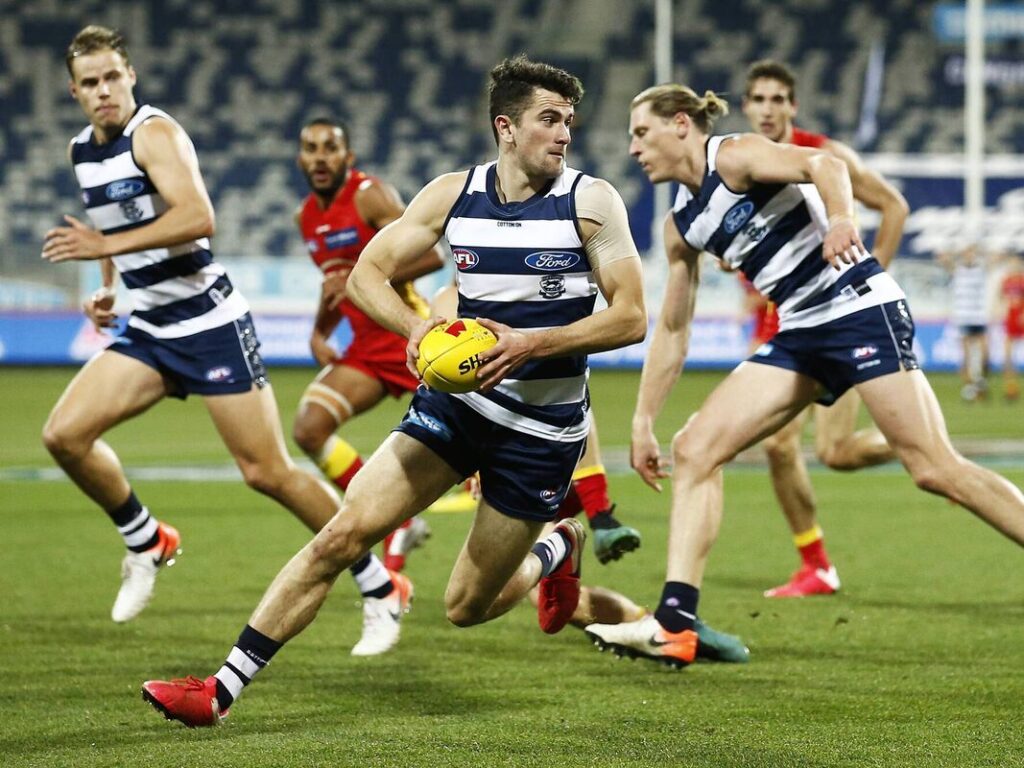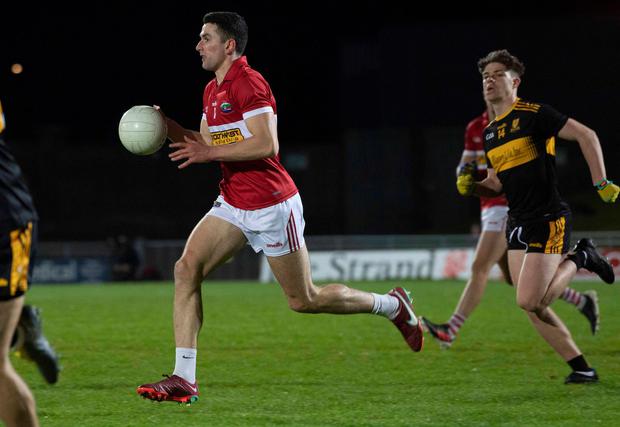I’ve been given the task from the great people over at Elevate Performance to give a run down on the differences and similarities between the AFL and GAA environments for anyone who might scroll away through with a bit of interest. Although I’ve unfortunately never made my Senior Inter-County debut in the green and gold of Kerry, I’ll give you my perspective on the performance differences between the GAA & AFL from the year I spent in with the Kerry Senior squad in 2016, my observations of the intercounty scene from afar and the 6 years I’ve spent in the AFL with the Geelong Cats. In pretty much any high performance environment, preparation, mindset & skill level are key pillars of performance for any team. I’ll endeavour to break these elements of performance down and compare my experience of the GAA and AFL.

Preparation
Preparation involves everything that goes into you being at your best in either code and achieving your goals. The pre-season training, nutrition, strength & conditioning, skills sessions & mindset training make up the bulk of preparation in sports. I’d include recovery in this as recovery is essentially trying to prepare an athlete for his/her next session as effectively as possible. In my experience, both the AFL and the GAA are highly effective in the areas above but there are 2 key areas that separate them both from a players’ perspective – time & resources.
In the AFL, it’s not uncommon for clubs to have full time nutritionists, S&C coaches, physios, doctors and sports psychologists. Although I was never found wanting in most of these areas with Kerry from a resource point of view, it just meant that, as a player, one would have to sacrifice ones ‘down time’ after a full days work or study to go and see a physio in Tralee on his/her day off for example. Whereas here, players can get their training, weights, physio treatment and recovery done all in the one place and knock off at 3/4pm to do whatever. This doesn’t mean that Gaelic football players miss out on these aspects of performance, it just means that they would probably have to access them after their work. Basically, this means that rather than sacrificing these performance elements, they would have to sacrifice a substantial amount of time elsewhere in their private lives.
By no means do I think that Kerry are in great need of an influx of money to prepare and perform to the best of their abilities. Kerry have always been blessed with the generosity of donors, volunteers and supporters to provide the teams with all that they need to succeed. But with the larger pool of resources that AFL clubs have, simply makes it easier for players to access high quality equipment, experts and other benefits. This doesn’t make AFL teams more effective necessarily, but I do think it helps in efficiency. For example, if an AFL player gets hurt at training, he can get an MRI and results back within 24 hours and sometimes within just a few hours. Or when training ramps up in pre-season clubs can hire a cryotherapy chamber for a period of weeks on top of the recovery facilities that are available at the clubs. To compliment the growing studies on the importance of sleep, Geelong has installed a ‘sleep room’ for anyone who needs an extra kip between commitments. These things help in efficiency, but they’re not essentials.
The additional sacrifice in time needed to tick all the boxes in the GAA is the main difference in terms of preparation. It takes a little more organisation, sacrifice and planning from GAA players to be able to get the optimal nutritional consumption around work/study and training. But all in all, there’s very little between the quality of preparation for performance. It’s simply easier for AFL players to get it right with the resources on site. On top of that, there is plenty of time after club commitments to do whatever an AFL player wants to do.

Mindset
The definition that pops up on Google for mindset is, ‘the established set of attitudes held by someone’. With this definition in mind, it must be said that the mindset towards AFL having come from a GAA background is different. Growing up in Kerry, football is everything. In my case, it was in my head morning, noon and night. The goal is to win All-Irelands with Kerry and to celebrate with the loved ones who helped to make it happen. Everything else is secondary. You ideally get a job that leaves you with enough time and opportunity to get the best out of yourself in football. You represent your family, your community, your club and your county when you go out to play. The people love and value it. You work hard in preparation because it’s what’s expected of you. You want to contribute all that you can to achieve the common goal and for the love of the game. It’s amazing watching the reactions of AFL players when I tell them this. Invariably, I’ll get asked, ‘’and how much do they get?’’. Their faces when I respond with ‘’they don’t get paid’’ tells me that, of course, the mindset is different here.
The addition of money makes many things more complex. In Australia, even the local footy clubs pay their players. They know no different. There’s no rule to state that you play with where you’re from. So transferring from one club to another isn’t uncommon. The same attachment, love and loyalty of clubs exists in Australia but it’s far rarer in the AFL than it is in Kerry or the GAA. Many of the Irish AFL players struggle with this. They miss their small tight-knit communities revolved around the local GAA club and still have the burning desire to play with their clubs and counties. Irish players with intentions of playing Aussie Rules need to pack some of that mindset in their luggage when they make the move to Australia and attach it to their new clubs. You’re no longer playing for your local club/county. In fact, most of your local community and loved ones barely have a clue what the new sport your playing involves! But, you need to attach some of that love and belonging to your new club or you’ll always feel too strong of a pull for home. Luckily, I play for a fantastic organisation with amazing values and culture. The Geelong Cats have made it easier to grow my love and care for the club and its people over my time here. I love my teammates and the people there. My mindset towards AFL has been malleable and it’s growing and adjusting over time. But players can’t be blinded by the sword that’s hanging loosely over their careers. The business side of AFL clubs will always exist. If you don’t perform well enough you don’t just get dropped – you become unemployed.
As a competitive person, you always want to compete against the very best. You want to bring the very best out of yourself. This doesn’t change regardless of what sport you are playing. The main difference comes in the emotions of winning and losing. As someone who has been immersed in all things Dingle and Kerry GAA from a very young age, winning and losing feels very personal and potent. It means so much to the people involved – teammates, coaches, supporters, families – that you carry with you a responsibility to represent them well. A win is also their win. A loss is also their loss. As a competitive person, winning and losing is also very potent in professional sport but the business side of it comes into play. I didn’t grow up in Geelong. My family didn’t support Geelong Cats or have any involvement with them. So it feels less personal in that sense. In my experience, the Geelong Cats have always encouraged family involvement and always have the doors open for all families. They have done a great job of making it more personal for players and building that community feel found in GAA clubs/counties. For these reasons, the mindset will never be identical in both codes but players will always endeavour to get the most out of themselves regardless. In either code, psychology/mindset is just as much of a skill as kicking and catching. A quote that always stuck with me is that the mind is the player and the body its tools. There’s also the analogy of the driver and the Ferrari – there’s no point having a Ferrari of a body if the driver will drive it like a Fiat. Fortunately, the importance of the psychological side of the game is growing in popularity in both codes. Every year now we hear of the different methods or the different experts that have worked with champion teams on their path to success.

Skill Level
From a skills perspective, Gaelic football and Aussie Rules have many differences. The Irish are always astounded as to how Aussie Rules players kick a oval ball around accurately and the Australians are always astounded as to how the Gaelic footballers kick a round ball so accurately! So the ball is obviously a major difference and a challenge to overcome. Then, there is the tackling. In Aussie rules, you are rewarded with a free-kick for wrapping the ball-carrier up in a tackle and taking him/her to ground. This makes a player less inclined to hold on to the ball for too long in Aussie Rules. It’s also a very different type of fitness needed in Aussie rules. You either need to be competent at everything or compensate by being really good at certain aspects of fitness. For example, it’s not uncommon for games to last 120+ minutes in the AFL. So for the elite longer distance runners, this is a major advantage. When everyone else is tiring out in the 4th quarter, the elite runners run amok. Gaelic footballers need to be more explosive runners and be strong in repeated sprint efforts. Longer distance endurance isn’t generally as important in a shorter game. Having played for Dingle since arriving home from Australia in October, I felt the difference in fitness between the codes. Gaelic football is more free-flowing and faster which requires players to be fast and endure more high-speed running/repeat effort sprints with little opportunity to take a breather. You can expect 90+ stoppages a game in the AFL between ball-ups, throw-ins and the like bringing more opportunity to take a breath although the game goes on for twice as long.

CONCLUSION
All in all, despite the obvious differences in terms of rules of the sport, professionalism, structure of the competitions etc., I think both codes provide players with environments where they can thrive. It’s just easier for AFL players to tick all the boxes not having careers outside of the sport. This luxury is not granted to Gaelic footballers. As a result, the main difference between the lifestyles is the spare time AFL players have to either invest in getting their bodies right, to explore outside interests or to relax.
I’m writing this at home in Kerry after enduring a rollercoaster AFL season and having played my first game of Gaelic football in 4 years for Dingle against Dr Crokes recently. Fortunately, we were able to get over the line against them in what was a very emotional return for me personally. Getting to play for Dingle is something I’ll always cherish and I’ll always be grateful to the Geelong Cats for their understanding and care in allowing me to play. Although the AFL season had its ups and downs, I was also fortunate to bring home an AFL Premiership medal in my pocket. Having my brother John at the Melbourne Cricket Ground on Grand Final day in the stands with over 100,000 others made it all the more special!

